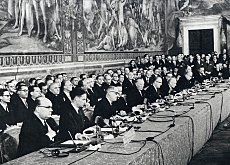
Europe marks 50 years – without Switzerland

Fifty years ago the Treaty of Rome laid the foundations for a new Europe – one that would leave the Swiss on the sidelines, where they still stand today.
Even the day after the historic signing on March 25, 1957, Swiss newspapers were caught between enthusiasm and scepticism for the new European Economic Community (EEC).
According to historian Georg Kreis, Switzerland even took part in an attempt to sabotage the EEC at the outset, fearful of having such a behemoth on its doorstep.
Along with Britain and a number of other countries, Switzerland pushed for the creation of a vast European free-trade zone that was supposed to sink the European political project. This resulted three years later in the formation of the European Free Trade Association.
“It’s clear that Switzerland had no interest in having a well-structured colossus in its backyard,” said Kreis, who is director of Basel University’s European Institute.
Pooling forces
In 1951 France and Germany were joined by Italy, the Netherlands, Belgium and Luxembourg in forming the European Coal and Steel Community, which pooled the heavy industries that had produced arms during the Second World War.
Carried by the momentum, the six tried to establish a common army. But the European Defence Community plan was shot down in 1954 by opposition in the French parliament from Gaullists and communists.
Yet the six nations had another trick up their sleeve. Three years later, in the impressive surroundings of the Capitol in Rome, representatives from each country signed the accord that gave birth to the EEC.
The treaty’s aim: “to lay the foundations of an ever-closer union among the peoples of Europe”.
In the meantime, the new community would concentrate on setting up a “common market”, based on the free movement of people, goods and services, with the removal of customs barriers between member states.
“Fourth Reich”
Back in Switzerland, some saw the accord among the six nations as a “Fourth Reich”, while others saw it as a serious blow to the Swiss economy because of the emergence of a new customs barrier, Kreis said.
The Swiss press for the most part simply described the signing of the Treaty of Rome as a historic achievement. The Neue Zürcher Zeitung said it was “a significant step along the path towards a united Europe”.
But the paper’s Rome correspondent added that the signatories were “conscious of the difficulties and resistance blocking the realisation of certain aspects of the accord”.
For the Journal de Genève “Europe is, despite everything, on the move”. It said the treaty gave the West a kind of “provisional executive board” and would result in “the much-needed formation of European assemblies”.
“For the first time in the recent history of Europe, one gets the impression of a real sense of belonging and a real sense of cooperation among the family of European peoples,” wrote the Basler Zeitung.
Trouble ahead?
The leftwing daily Basel AZ, while saluting “history in the making” predicted “teething problems” for the EEC.
As for the Tages-Anzeiger, it said that only future generations would be able to judge whether the events in Rome were truly significant.
Equally sceptical was the Gazette de Lausanne, which wrote: “This Europe can only believe in itself if the church bells of Rome have truly heralded the start of a new era.”
Newspaper commentators did agree on one thing, however: that whatever its importance for Europe, the treaty had no bearing whatsoever on the destiny of neutral Switzerland.
swissinfo with agencies
1948: Switzerland joins the future Organisation for Economic Cooperation and Development (OECD), which was set up to administer the Marshall Plan for the reconstruction of Europe.
1949: Creation of the Council of Europe for the promotion of democracy and human rights on the continent. Switzerland reckoned its neutrality blocked it from joining. The Swiss didn’t take that step until 1963.
1960: On Britain’s initiative, nations that didn’t want to join the EEC (including Switzerland) founded the European Free Trade Association (Efta).
1972: Switzerland signs a free trade accord with the EEC.
1992: Bern lodges a request to join the European Union (still frozen today). The same year, the Swiss people chose not to participate in the European Economic Area (EEA), which brought together the European Union and Efta. However, the three other Efta countries – Liechtenstein, Iceland and Norway – did join the EEA.
1999 and 2004: Bern and Brussels sign two sets of bilateral accords on the opening of markets, security cooperation, asylum, the environment and culture.
Today: Swiss membership of the EU is not on the agenda. For that to happen, there would have to be a nationwide vote and opinion is overwhelmingly against.

In compliance with the JTI standards
More: SWI swissinfo.ch certified by the Journalism Trust Initiative































You can find an overview of ongoing debates with our journalists here . Please join us!
If you want to start a conversation about a topic raised in this article or want to report factual errors, email us at english@swissinfo.ch.